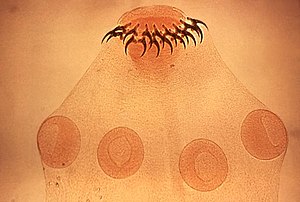
A sucker in zoology is a specialised attachment organ of an animal. It acts as an adhesion device in parasitic worms, several flatworms, cephalopods, certain fishes, amphibians, and bats. It is a muscular structure for suction on a host or substrate. In parasitic annelids, flatworms and roundworms, suckers are the organs of attachment to the host tissues. In tapeworms and flukes, they are a parasitic adaptation for attachment on the internal tissues of the host, such as intestines and blood vessels.[1] In roundworms and flatworms they serve as attachment between individuals particularly during mating. In annelids, a sucker can be both a functional mouth and a locomotory organ.[2] The structure and number of suckers are often used as basic taxonomic diagnosis between different species, since they are unique in each species. In tapeworms there are two distinct classes of suckers, namely "bothridia" for true suckers, and "bothria" for false suckers. In digeneal flukes there are usually an oral sucker at the mouth and a ventral sucker (or acetabulum) posterior to the mouth. Roundworms have their sucker just in front of the anus; hence it is often called a pre-anal sucker.
Among chordates, some fishes and mammals have suckers, which are used as a holdfast to substrata. Among fishes some members of the order Perciformes have modified fins that form a sucker. Some bats, the Madagascar and the Western sucker-footed bat have unusual suckers on their limbs that are useful during roosting. Some amphibians such as the frog have adhesive pads on their toes to help with their locomotion.
- ^ Castro GA (1996). "Helminths: Structure, Classification, Growth, and Development". In Baron S (ed.). Medical Microbiology (4 ed.). Galveston (TX): University of Texas Medical Branch at Galveston. ISBN 978-0-9631172-1-2. PMID 21413252.
- ^ Stern-Tomlinson W, Nusbaum MP, Perez LE, Kristan WB Jr (1986). "A kinematic study of crawling behavior in the leech, Hirudo medicinalis". J Comp Physiol A. 158 (4): 593–603. doi:10.1007/bf00603803. PMID 3723440. S2CID 9669237.